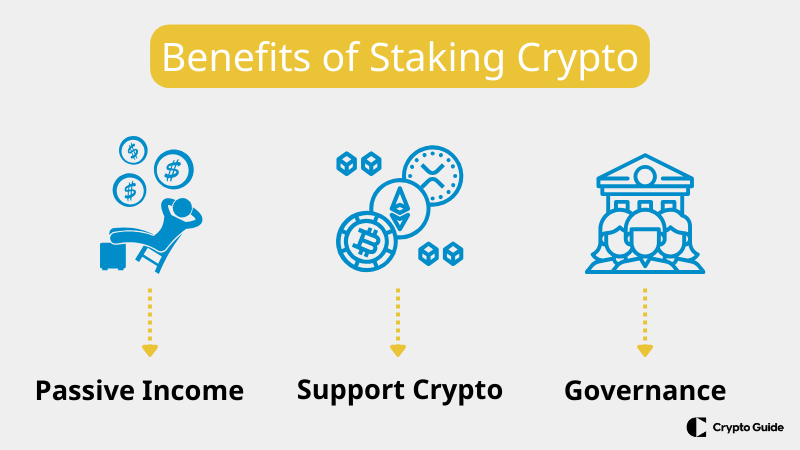Benefits of Staking Crypto
Explore the benefits of staking crypto: Learn how it offers a rewarding way to earn passive income, support cryptocurrency development, and engage in governance decisions. This article dives into the advantages and transformative potential staking brings to both individual investors and the broader digital currency ecosystem.
Table of content
Earning Passive Income
By staking your cryptocurrencies, you are earning passive income and supporting the development and growth of the cryptocurrency ecosystem. Staking helps to ensure the security and stability of the network, which is essential for the long-term success of the cryptocurrency. Also, staking can give you a sense of ownership and involvement in the cryptocurrency community.
Here are some of the benefits of crypto staking to earn passive income:
- Passive income: One of the main benefits of staking crypto is a passive income stream, meaning you can earn money without actively trading or managing your investments.
- Support the cryptocurrency ecosystem: By staking crypto, you are helping to support the development and growth of the cryptocurrency ecosystem.
- Participate in governance: Some PoS blockchains allow stakers to vote on governance proposals, which can give you a say in the future of the network.

Overall, staking crypto is a relatively new and innovative way to earn passive income and support the cryptocurrency ecosystem. It can be a rewarding experience for those willing to take on some risk and actively participate in the decentralized finance (DeFi) space.
Network Security
Staking serves as a pivotal mechanism for upholding the security and integrity of proof-of-stake (PoS) blockchain networks, particularly in the context of their consensus mechanism. In PoS, validators play a crucial role in confirming transactions and ensuring overall network stability.
Staking is a powerful incentive for individuals to become validators by requiring them to lock up their cryptocurrency holdings, demonstrating a committed contribution to the network's security. This contribution manifests in various ways, including selecting trustworthy validators through a staking-based mechanism. The network ensures a vested interest in its success by mandating a significant stake for validator status, fostering a secure and reliable consensus process.
Additionally, staking introduces a slashing mechanism to penalize validators for malicious actions, thereby preserving network integrity and deterring potential misconduct. Beyond security, staking encourages community participation in network governance, enabling stakeholders to vote on protocol-related proposals.
This decentralized and community-driven approach enhances overall network resilience. In summary, staking emerges as a fundamental component, promoting the security, stability, and decentralization of PoS blockchain networks and cultivating a trustworthy ecosystem for decentralized applications and cryptocurrency transactions.
Participation in Governance
By participating in governance, stakers can influence the trajectory of the network and ensure that it aligns with their interests and values.
Here's how staking facilitates participation in governance:
- Token-based Voting: Staking generally grants stakers voting power proportional to the amount of cryptocurrency they hold. This creates a direct link between staked assets and governance influence, ensuring that those who contribute more to the network's security and operation have a stronger voice in decision-making.
- Community-driven Governance: Staking fosters a more decentralized and community-driven approach to governance. Unlike traditional centralized systems, PoS networks empower ordinary users to participate in decisions that affect the network's future. This democratization of governance promotes a sense of ownership and engagement among stakers.
- Transparent Decision-making: Governance proposals are often publicly visible and open for discussion, allowing stakers to evaluate and express their opinions. This transparency fosters informed decision-making and ensures the community has a say in the network's evolution.
In conclusion, staking is pivotal in enabling participation in governance within PoS blockchain networks. By empowering stakeholders with voting rights and fostering a community-driven approach to decision-making, staking promotes a more democratic and transparent governance structure, ensuring that the network evolves in a way that serves the interests of all stakeholders.
Token Appreciation
Staking can have a positive impact on the appreciation of a cryptocurrency's token price in several ways:
- Increased Demand and Liquidity: Staking incentivizes individuals to hold and lock up their cryptocurrency holdings, which can increase its demand in the market. This can lead to a higher token price as the supply of available cryptocurrency decreases.
- Network Growth and Adoption: Staking contributes to the growth and adoption of a PoS blockchain network, which can indirectly lead to an appreciation of the network's native token. As the network becomes more popular and widely used, the demand for its token will likely increase, potentially driving up its price.
- Funding for Network Development: Staking rewards provide a source of funding for developing and maintaining the PoS blockchain network. This funding can improve network infrastructure, enhance security measures, and attract new users and developers, further supporting the growth and adoption of the network and its token.
- Reduced Supply and Increased Scarcity: Staking can effectively reduce the circulating supply of a cryptocurrency, creating scarcity and potentially driving up its price. As more and more individuals stake their tokens, the number of tokens available for trading decreases, which can lead to increased demand and a higher token price.
Staking Rewards and Incentives
This brings several advantages of staking crypto:
- Passive Income: Stakers earn rewards through newly minted tokens or fee for transaction confirmations. This can provide a passive income source for individuals willing to lock up their tokens for some time.
- Community Engagement: Staking can encourage individuals to participate in the governance of the network by voting on proposals that affect its development and operation. This gives stakers a say in the network's future and helps ensure that it is aligned with their interests.
- Support for Network Growth: Staking helps to grow and maintain the network's user base and ecosystem. This can lead to increased adoption and value for the network's native token.
Alignment of Interests
When the interests of all stakeholders are aligned, it promotes a more harmonious and productive environment for the network's operation:
- Increased Security: When all stakeholders are vested in the network's security, it discourages malicious behavior and protects the network from attacks.
- Enhanced Network Stability: Alignment of interests fosters a more stable and predictable network environment. Stakers are more likely to participate actively and maintain their staked assets when they believe in the network's long-term viability. This stability is essential for the continued operation of the network.
- Reduced Transaction Fees: Aligning interests can lead to reduced transaction fees, as stakers are incentivized to maintain the network's efficiency and attract more users. This is because lower transaction fees make the network more attractive for users, driving demand and ultimately increasing the value of the network's native token.
- Enhanced Persistence: Alignment of interests contributes to the network's persistence, ensuring that it continues to operate and grow despite challenges. When all stakeholders have a shared interest in the network's success, they are more likely to invest time, resources, and capital into maintaining its operation.
In conclusion, alignment of interests is a cornerstone of PoS blockchains, fostering a more secure, stable, and community-driven network environment.
Diversification of Crypto Portfolio
Diversifying your crypto portfolio offers a dual advantage by reducing overall risk and potentially enhancing returns. By spreading investments across different cryptocurrencies, the portfolio becomes less susceptible to the negative impacts of a downturn in any digital asset.
This risk mitigation strategy not only safeguards against potential losses but also allows for the possibility of enhanced returns as one cryptocurrency's performance can offset another's losses. Moreover, diversification provides exposure to various sectors within the cryptocurrency market, such as payment, smart contracts, and DeFi, unlocking diverse growth opportunities.
Additionally, in the face of market events like regulatory changes or major news announcements, a diversified portfolio proves invaluable, helping to mitigate the impact of such events on the overall investment. In summary, diversification in the dynamic cryptocurrency landscape is a comprehensive approach, balancing risk, maximizing returns, and navigating market fluctuations.
Conclusion
Staking offers various benefits for both the network and its participants. It contributes to network security, decentralization, sustainability, and community engagement. It provides passive income, encourages participation in governance, and supports network growth.
Staking rewards and incentives align interests, fostering a more secure, stable, and community-driven network environment. Diversification helps to reduce risk, enhance returns, gain exposure to different sectors, and mitigate market events.
FAQ About Benefits of Staking Crypto
Is staking crypto still worth it?
Staking crypto can be a rewarding way to earn passive income, but it has risks.
Is staking good for long term?
Staking crypto can be a good long-term investment, but it is important to research and choose a reputable validator.
Can I lose crypto by staking?
Yes, you can lose crypto by staking if you choose a dishonest validator.
Is staking crypto better than investing?
Whether staking crypto is better than investing depends on your circumstances and risk tolerance.
Does crypto still go up when staking?
Yes, the price of the cryptocurrency you stake may still go up even if you are earning staking rewards.




![Top 10 Best Crypto Staking Platforms for [year]](https://betoncrypto.io/app/uploads/2024/12/cryptostaking.webp)

![Best Cryptos to Stake in [year]](https://betoncrypto.io/app/uploads/2024/11/image1-4.webp)
